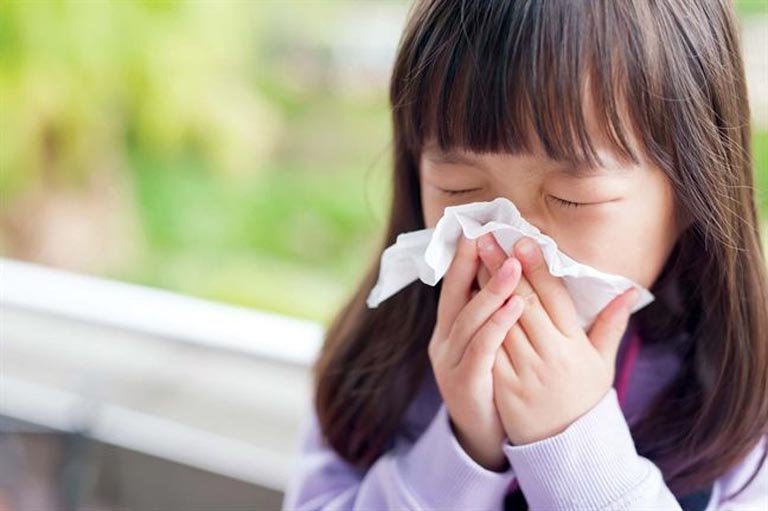Rhinopharyngitis in children is an infection and swelling of the nose, pharynx, or throat of a child. The disease is spread through contact with droplets containing the virus in the air, which are spread when an infected person coughs, sneezes, blows his or her nose, or talks.
Causes of rhinopharyngitis in children
Most cases of rhinopharyngitis in children are caused by viruses such as Adeno virus, Rhino virus… and a few cases are caused by bacteria such as streptococcus. When these agents enter the body through the nose and throat (the pathways through which air from the outside enters the lungs), they will disrupt the normal activities of the nose, weakening the immune system. This creates favorable conditions for bacteria to grow and lead to bacterial superinfection.
Some causes that can lead to rhinopharyngitis in children:
The living environment plays an important role in the health and immune system of children. Children living in polluted environments will have a high risk of diseases such as rhinopharyngitis. Moreover, sudden changes in the environment can also make it difficult for children to adapt, leading to susceptibility to infection. Specifically:
Unusual changes in weather, such as sunny mornings, rainy afternoons, or when the temperature drops suddenly. Polluted living environment, lots of dust, especially cigarette smoke. Children often go to crowded places such as kindergartens, schools. Children in the weaning or weaning stage. Damp living space. Contact with dog, cat or other pet hair.
Another common cause is bacteria, viruses, fungi causing rhinopharyngitis in children, of which Rhinovirus is one of the most common causes, accounting for 10 – 40% of cases. In addition, other viruses such as influenza virus, measles, Adenovirus … can also be the cause of the disease.
In addition, rhinopharyngitis in children can also be caused by bacteria and fungi, such as pneumococcus, staphylococcus, streptococcus … Of which group A streptococcus (S. Pyogenes) is a common type of bacteria, which can lead to dangerous complications. Children infected with this type of bacteria are at risk of complications such as acute arthritis and acute glomerulonephritis.

Rhinopharyngitis in children is spread through contact with droplets containing the virus in the air, which are released when an infected person coughs, sneezes, blows his or her nose, or talks.
Symptoms of rhinopharyngitis in children
After 1 – 3 days from the time the virus enters the body, the child will have symptoms similar to a cold, including:
- Sneezing;
- Sore throat, sore throat, red and swollen throat;
- Nasal congestion, runny nose (nasal discharge is initially thin, colorless, odorless, then turns green, thick and has a fishy smell);
- Cough (initially dry cough, then turns into cough with phlegm);
- Fatigue.
In addition, the patient has body aches; Mild fever (in some cases, the child may have a high fever of 39 – 40 degrees Celsius); Headache; Loss of appetite. These symptoms make the child feel uncomfortable and often last from 7 – 10 days or longer.
Depending on the cause of the disease, children will have different symptoms, specifically: Children with viral rhinopharyngitis, viral rash, cough, diarrhea, conjunctivitis, runny nose… Children with rhinopharyngitis caused by group A hemolytic streptococcus: High fever (over 38.5 degrees Celsius), red and swollen throat, swollen tonsils with white discharge, swollen and painful neck lymph nodes…
Preventing nasopharyngitis in children
Nasopharyngitis in children is spread through contact with droplets containing the virus in the air, which are spread when a sick person coughs, sneezes, blows his nose, or talks.
To prevent the disease, parents can take the following measures: Train children to wash their hands regularly with antibacterial soap. Avoid letting children come into contact with people who are sick or have signs of nasopharyngitis. Thoroughly clean the living space, the area where children often play, and their toys. Avoid letting children share personal items with others. When coughing, sneezing, or blowing their nose, children should cover their mouth and nose with a tissue, then throw the tissue in the trash and wash their hands immediately.
Vaccinate children fully and on schedule with recommended vaccines; Regularly clean children’s noses and mouths with saline. Implement a scientific nutritional regimen and ensure children drink enough water every day. Avoid letting children put their hands on their face, especially the nose and mouth. Keep your child warm when the weather turns cold, especially the neck, chest, feet and hands. Make sure the child’s living environment is clean, free of mold, dust and cigarette smoke.
The nutritional regimen that needs attention for children with rhinopharyngitis is to maintain a complete and scientific nutritional regimen, this is very important, you can replace daily dishes with soft, easy-to-digest and easy-to-swallow foods, but still ensure enough nutrients for the child. At the same time, mothers should feed their children according to their needs, divided into many small meals a day with less food each meal to ensure that the child eats enough without being too full. Note that parents should not force their children to eat too much, because this can make them feel uncomfortable and afraid to eat.
In addition, to help reduce children’s cough, parents can use natural cough remedies such as honey, lemon, ginger, etc. These measures are not only safe but can also help soothe the throat and reduce uncomfortable symptoms for children.





